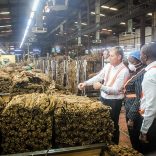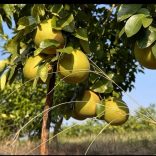Mozambique: Vision Sugar Holdings takes over Xinavane and Mafambisse - AIM
Joe Hanlon: ‘Sustenta’ is the first serious attempt to transform the rural environment in Mozambique – Carta

File photo: MADER
Behind the scenes at MADER (Ministry of Agriculture and Rural Development) and in the inner circle of Minister Celso Correia, there is a feeling that ‘Sustenta’ has its feet on the ground and everything is being done above board.
The programme, both loved and criticised (increasingly, less criticised), is based, in part, on the works of Joe Hanlon and Teresa Samart, which need no introduction. The two wrote “Chickens and beer: A recipe for agricultural growth in Mozambique” (2014), and “Do bicycles equal development in Mozambique?” (2008), both probably among the books at Correia’s bedside.
‘Carta de Moçambique asked Joe Hanlon if he could see in Sustentá traces of what he and Teresa advocate. Yesterday, the following answer arrived.
‘Sustenta’ appears to be the first serious attempt to support rural Mozambique. It is a great satisfaction and honour for us that Minister of Agriculture Celso Correia says he is influenced by our books “Há mais bikes” and “Galinhas e Cerveja”. Both books were based on extensive field research, on talking to farmers and extension workers, as well as a wide range of experts in Maputo.
We’re not writing about Sustenta, because Covid-19 has prevented us from traveling to Mozambique. We’re looking forward to returning after the third Covid-19 wave, to take a closer look at Sustenta on the ground. So the comments we share now are based on limited knowledge, from a distance. However, some general points can be made.
Chickens and bicycles are based on the transformation of large numbers of peasants to become what we call “commercial family farmers”. These are families that grow most of their own food, but also actively grow for the market. The starting point for this can be quite small – five hectares or even less.
We see guaranteed markets as the key to this; if a family produces a crop, it will be able to sell it at a reasonable price. One model we cited was tobacco. The title of the book “Chickens and Beer” refers to two crops developed for commercial family farmers. The first is soy for chicken feed, which took seven years to establish and has had spectacular success. The second is cassava for beer, which ended up not working.
Since we wrote the book, the pigeon pea fiasco shows that the guaranteed market has led tens of thousands of peasant families to produce for that market, only to have the guarantee revoked.
So there are two fundamental differences with Sustenta as we understand it from a distance. First, we promote the transformation of small family farmers into commercial farmers, while Sustenta is starting with already commercial farmers with more than 14 hectares. The second difference is that we prioritise guaranteed markets, which Sustenta does not.
We also emphasise the need for a guaranteed market at a fair price, which requires a way of setting a minimum price. In “Chickens” we have an entire chapter about this. There is a market, but the price paid to the farmer is very low. Becoming a commercial maize farmer, even with five hectares, requires the use of fertilizers, some irrigation and usually mechanical ploughing – all of which must be paid for in advance. Almost all peasants are too poor to do this. But in Mozambique, the price paid to farmers for maize is less than the cost of inputs. Neighbouring countries – Zimbabwe, Malawi and Tanzania – all have some combination of fertiliser subsidies and a minimum price.
Sustenta has already done this once, last year, with its subsidy to support the price of cotton in Cabo Delgado. This broke all neoliberal free market rules. The subsidy went to cotton companies, but it meant they could pay a higher guaranteed price.
Mozambique – under pressure from the World Bank – still follows the neoliberal free market myths of 30 years ago, which have been abandoned elsewhere. The “free market” does not interest small farmers. Over the past 70 years, agriculture has been hugely successful in Europe and the United States on the basis of subsidies and other market interventions to guarantee fair prices to farmers. And, in both Europe and the United States, the majority of farmers are commercial family farmers.
Celso Correia is a minister powerful enough to challenge World Bank orthodoxy and follow the American and European models. He did it with cotton.
But it requires a fundamental shift in thinking to support farmers who grew pigeon pea and would grow corn and rice as cash crops if they had a fair market. The lesson from our books is that guaranteed markets at fair prices are the starting point for rural development.












Leave a Reply
Be the First to Comment!
You must be logged in to post a comment.
You must be logged in to post a comment.